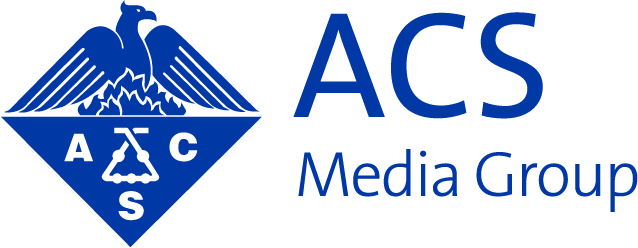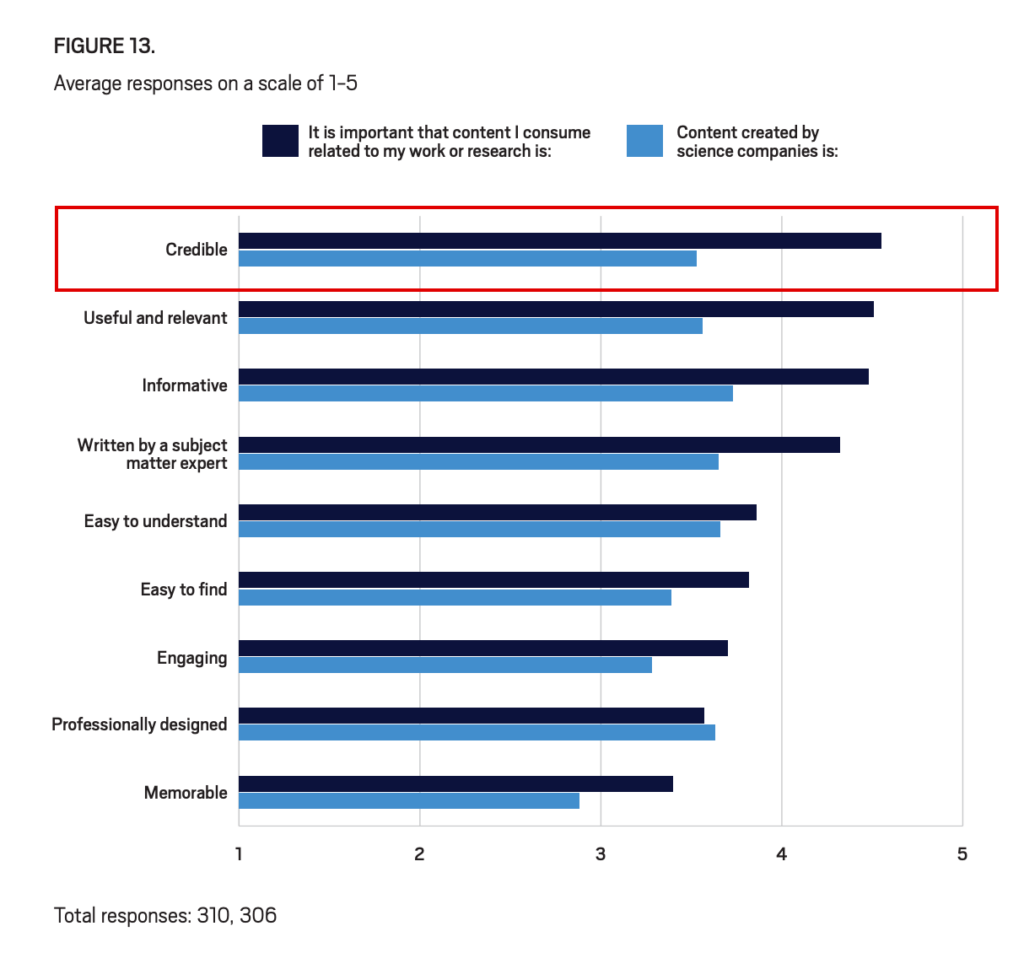Interviewing subject matter experts (SMEs) is one of the best parts of being a science writer and marketer.
You get to meet new people who are passionate about their work, learn more about that work, and dig up the stories and emotions that drive it.
And, if done well, you don’t just walk away from an interview with quotes and stories that make creating content easier: you also get content that satisfies one of your audience’s content cravings.
Credibility.
As content marketers, one of the ways we can inject credibility into B2B content is by including subject matter experts in the content creation process through interviews.
Why You Need Subject Matter Experts’ Voices
In C&EN BrandLab’s recent survey of people working in the chemical sciences, “credibility” received the highest average rating for the qualities chemists want from content.
In other words, they’re looking for content that they can trust and believe.
But, for a marketer creating content for a highly technical audience, that credibility can be difficult to establish.
Carol Lan, in her newsletter Contented, writes about how B2B marketers are often imposters:
Essentially, our job is to create content [that] speaks to a group of buyers whose professional lives we most likely will never experience.”
– Carol Lan, Contented newsletter
So, how can you, an imposter, create credible content?
One approach: interview subject matter experts.
These experts may be people who work for your organization or those outside it who are willing to speak with you. No matter who they are, they should be in a position to provide a unique and valuable perspective related to the topic of your content.
By weaving in their insights, quotes, and stories, you signal to your audience that your content has something to say that’s worth believing.
At C&EN BrandLab, we often interview subject matter experts and include their quotes and insights in our white papers, e-books, feature articles, and other custom content. Below are our practical tips for how to get the most out of your interviews with subject matter experts.
How to Prepare for Subject Matter Expert Interviews
1. Do your research.
Preparation can make the difference between an awkward dud of an interview and an interview full of quotes and stories that you can’t wait to share.
Preparation is key. SMEs do not have much time to spend on interviews, so you need to make the most of the time that you have. Do plenty of research before the interview and have a clear idea what you are trying to achieve before scheduling a meeting.”
– Jesse Harris, Senior Editor at C&EN BrandLab
To get started, make a plan for your content with a detailed outline. Start researching the topic and note any questions you have.
While creating your outline, you’ll likely encounter other resources that feature or are authored by relevant experts. Keep track of these names—they could be an ideal subject matter expert for your own content.
Once you’ve finalized your outline, are familiar with the topic, and have identified potential subject matter experts, then it’s time to reach out. When you do, explain the project, what you hope they can contribute, and what an interview would entail. Hopefully, they’ll say yes, and you can arrange the interview.
2. Write down and prioritize your interview questions.
Before an interview, write down all the questions you have for the expert. For a 30-minute interview, I suggest preparing 10-15 questions in advance. Organize your questions in a logical order, prioritizing the ones you want answered most.
3. Get your recording technology sorted out.

If you’re hosting the interview over the phone or video conference, make sure you know how to use the recording option. If it’s in person, download a reliable audio recording app to your phone or computer. Don’t forget to test the equipment and ensure your device has plenty of available memory to record the full conversation.
For interviews that you’ll turn into audio or video content, it’s on you to coordinate the technical logistics. Don’t assume your subject matter expert knows what it takes to record quality audio or video. Consider supplying your expert with a good microphone if they don’t have one. Share lighting recommendations, such as avoiding back-lighting and utilizing front-facing natural light when possible.
How to Run Subject Matter Expert Interviews
With all that preparation behind you, now it’s time for the actual interview. Hosting a good interview is a learned skill and one that will only come with practice. Here are a few suggestions to get you started.
1. Ease into the interview.
Nerves, eagerness, or a deadline might cause you to launch right into your questions as soon as you and the subject matter expert are on the call. Don’t. Take a few beats to ease into the conversation. Introduce yourself, thank them for participating, and briefly explain what the interview will be used for.
2. Keep the questions direct and concise.
Complex, multi-part questions will likely confuse your subject matter expert and yield confused answers. You can lead into your question with context, but when it comes to asking the actual question, keep it direct.
3. Listen. Listen. Listen.
The best interviewers are active listeners. They pick up on the interesting, confusing or contradictory responses from their sources and know how to follow up.
One of the simplest tools in the active listening toolbox is to repeat back what someone told you in your own words: “What I’m hearing is…” or “So, in other words…” This tool works well because it signals to your interviewee that you are listening and gives them a chance to clarify, correct, or expand on what they just said.
Bonus Tip: Take notes! I find writing notes by hand during my interviews help me listen better. Others let their recording software handle the notes. You’ll have to learn what works best for you.
4. Don’t be afraid to interrupt.
There’s only 10 minutes left in a 30-minute interview and your source has been droning on about the history of their field for the last five minutes. It’s information you neither asked for nor need and there’s no end in sight.
Don’t be afraid to gently interrupt and redirect the conversation. It might feel awkward in the moment, but it’s more respectful of both your and the subject matter expert’s time.
Try something like this: I’m sorry to cut you off, but do you mind if I pivot and ask another question? We can come back to this topic if we have time.
5. It’s okay to go “off script”.
Sometimes, in an interview, your expert is going to share a detail or story that you did not anticipate. You’ll have to use your judgment and active listening skills in the moment, but sometimes it’s worth following that thread.
Later, use the list of questions you prepared in advance to get back on track.
6. End on time.
There’s a time and place for letting a conversation meander. But if your expert agreed to set aside 30 minutes for you, honor that time. If you didn’t get all your questions answered and they’re important to the story you want to tell, ask if it’s okay to ask to schedule a follow up.
Side note: Don’t default to an email interview for your follow-up. Written responses are almost always going to be more stilted than what you’d get from an interview. Plus, you might find their responses are AI-generated, which won’t deliver on the credibility you’re looking for from your interview.



















